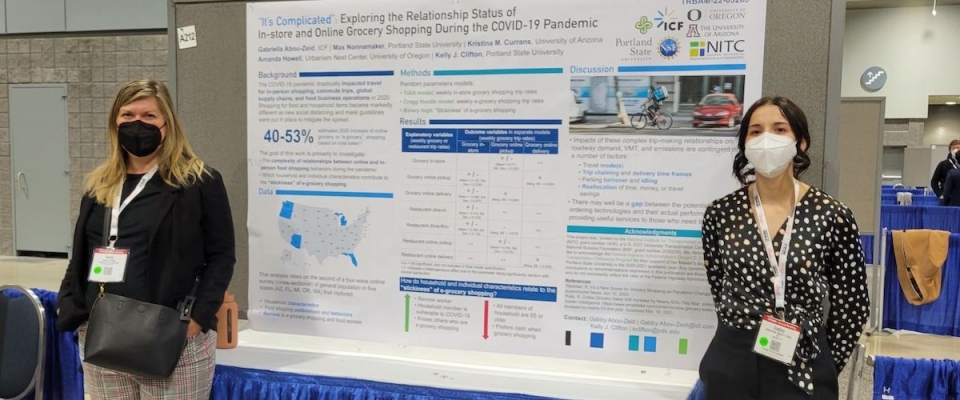PSU Graduate Gabby Abou-Zeid Explores Implications of E-Grocery Shopping during the COVID-19 Pandemic

In 2020, the COVID-19 pandemic drastically impacted travel for in-person shopping, commute trips, global supply chains, and food business operations. E-grocery pickup and delivery services saw unprecedented expansions in response. The adoption and use of these e-grocery services have implications for equity and mobility. A PSU masters thesis offers insights: "Adoption and Use of E-Grocery Shopping in the Context of the COVID-19 Pandemic: Implications for Transport Systems and Beyond" by Gabriella Abou-Zeid, a 2021 graduate of Portland State University with a masters in civil engineering.
"While the future adoption and use of e-grocery services is uncertain as the COVID-19 pandemic evolves, our analysis revealed a clear impact of the pandemic on e-grocery shopping behaviors, which has impacts for transportation network demand, safety, and equity," Abou-Zeid said.
Enhancing our understanding of the drivers of (and barriers to) online grocery shopping and its potential "stickiness"—or the extent to which e-grocery use will continue at the same or higher frequencies after the pandemic—is a prerequisite for unpacking current and future consequences of this ecommerce sector on people and transportation networks. The two goals of this work are:
- To explore the drivers of adoption and use of e-grocery services in the context of the COVID-19 pandemic, and
- To estimate "stickiness" of online grocery ordering behaviors – or the extent to which e-grocery use will continue at the same or higher frequencies after the pandemic.
Survey data (N=2,266) capturing household and individual information on demographics, attitudes, and behaviors were all employed in carrying out these goals. The culmination of results show attitudes and COVID-19 related variables are strong drivers of e-grocery adoption, use, and stickiness. COVID-19 related characteristics—including individual and household experiences related to employment, income, remote work, diagnosis, food insecurity, and changes in food shopping behaviors—were found to be significant across the suite of estimated models, demonstrating the sheer impact of the pandemic on household provisioning behaviors. Results from the "stickiness" analysis suggests households that are multimodal, below retirement age, and located in places with high e-grocery service availability are more likely to hold or increase their already elevated e-grocery usage. Households who have at least one member particularly vulnerable to COVID-19 or who reduced their in-store shopping frequency during the pandemic are also more likely to have e-grocery shopping "stick". Drivers of e-grocery delivery adoption varied among household income levels.
One theme resurfaced consistently throughout the analysis: the importance of attitudes in predicting behavior. “Attitudinal variables showed significance across all models examining e-grocery adoption, use, and ‘stickiness’. As just one example, households who knew others who shopped for groceries online, and who thought shopping online was easy, were more likely to demonstrate e-grocery adoption and use, and were more likely to continue e-grocery shopping behaviors after the pandemic. Households who preferred to use cash when grocery shopping were less likely to continue use of e-grocery shopping after the pandemic, which points to a potential barrier for un- or underbanked households in being able to easily use these services”, Abou-Zeid noted.
The work concludes with a synthesis of findings, highlighting key drivers of and barriers to online grocery shopping, the impacts of the COVID-19 pandemic on e-grocery, and implications for transportation systems and practice. This discussion includes recommendations for policy and future work.
The data collection effort, led by Dr. Kelly Clifton, supporting this research was funded by the National Science Foundation (NSF) and the National Institute for Transportation and Communities (NITC). Abou-Zeid would also like to acknowledge the Federal Highway Administration’s (FHWA) Dwight D. Eisenhower Transportation Fellowship Program (DDETFP) and the National Institute for Transportation and Communities (NITC) for the financial and professional support provided while developing her thesis.
Abou-Zeid presented this research in a poster session (download the PDF) at the 2022 annual meeting of the Transportation Research Board (TRB). She also presented her work at the two previous TRB conferences in 2020 and in 2021, where she was awarded her first and second Eisenhower Fellowship.
Abou-Zeid now works as a Transportation Data Specialist at ICF, supporting local, state, and federal clients in areas of transportation demand management (TDM), transportation systems management and operations (TSMO), public transportation investments, transportation and land use intersections (especially related to parking), and sustainable mobility. She currently resides in Tucson, AZ, where her transportation research journey began while researching walkability.
Photo courtesy of Gabby Abou-Zeid
Portland State University's Transportation Research and Education Center (TREC) is home to the U.S. DOT funded National Institute for Transportation and Communities (NITC), the Initiative for Bicycle and Pedestrian Innovation (IBPI), PORTAL, BikePed Portal and other transportation grants and programs. We produce impactful research and tools for transportation decision makers, expand the diversity and capacity of the workforce, and engage students and professionals through education and participation in research.


